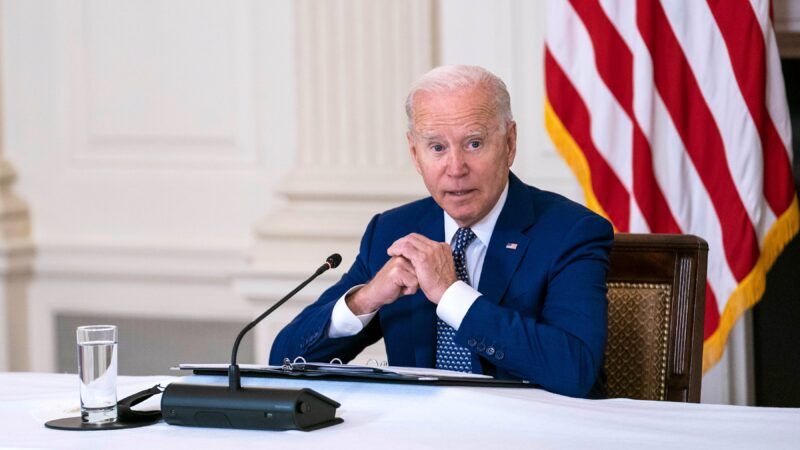Biden Admits New CDC Eviction Moratorium Runs Counter to 'the Bulk of the Constitutional Scholarship'
The Supreme Court will likely rule against Biden’s executive gambit.

Say this for President Joe Biden: He's willing to admit that the actions of his own administration might not always pass the constitutional smell test. Speaking to reporters this week, Biden announced that a new federal eviction moratorium was coming soon from the Centers for Disease Control and Prevention (CDC). "The bulk of the constitutional scholarship says that it's not likely to pass constitutional muster," Biden acknowledged. "But there are several key scholars who think that it may and it's worth the effort."
A majority of the U.S. Supreme Court is likely to agree with the bulk of scholars that Biden declined to heed. On June 29, a 5–4 Supreme Court let the previous CDC nationwide eviction moratorium remain in place until it was set to expire on its own on July 31. Four justices—Clarence Thomas, Samuel Alito, Neil Gorsuch, and Amy Coney Barrett—would have blocked the moratorium then and there. The swing vote was cast by Justice Brett Kavanaugh, who voted to let the moratorium remain in place, but only because "the CDC plans to end the moratorium in only a few weeks…and because those few weeks will allow for additional and more orderly distribution of the congressionally appropriated rental assistance funds." However, Kavanaugh stressed, "in my view, clear and specific congressional authorization (via new legislation) would be necessary for the CDC to extend the moratorium past July 31."
In other words, five justices have already strongly indicated that any new CDC eviction moratorium will meet its doom when it lands on the judicial chopping block.
So why is Biden still pressing ahead? He gave two, somewhat different explanations. The first was that he had found "several key scholars" willing to sign off on this new gambit. Who are they? One of them is Harvard law professor Laurence Tribe, a liberal legal icon, who confirmed to Politico that he had been advising the White House on this matter. "I think the odds [of success] are greater this time around," Tribe told Politico. The new CDC eviction moratorium was crafted in response to the rise of COVID-19's delta variant, Tribe argued, and thus "targeted in health-specific terms that are of a sort that fit the mandate of the CDC."
It's difficult to imagine this position of Tribe's actually attracting five votes on the current Supreme Court, but I suppose you never know.
Biden's second stated reason for pressing ahead with a new CDC eviction moratorium was not so much a legal rationale as it was a raw political calculation. "At a minimum," Biden said, "by the time it gets litigated, it will probably give some additional time while we're getting that $45 billion out to people who are, in fact, behind in the rent and don't have the money." In effect, Biden has more or less accepted that he has a legal loser on his hands and is now just trying to buy more time for Congress and the states to do their jobs.
Perhaps Biden should be listening to a different liberal Harvard law professor, Noah Feldman. Writing at Bloomberg, Feldman persuasively faulted Biden for "alienating the court and its new swing justice, Brett Kavanaugh." According to Feldman:
The fact that Kavanaugh was offering both pragmatism and a compromise deserves recognition and acknowledgment. The authority of the CDC to issue a moratorium on a social policy issue with an indirect connection to preventing disease was always in question, and reasonable people could differ on it. By allowing moratorium to expire and inviting Congress to act, Kavanaugh was making an entirely sensible judgment.
Congress could and should have acted. For it to create such a moratorium on evictions would be lawful; and Kavanaugh, in his statement, foreshadowed that he would vote to uphold such a ban, whatever his more conservative colleagues might do. There was a simple solution available, and Kavanaugh laid it out.
Instead, Biden is now moving ahead with an executive action that runs counter to swing vote Kavanaugh's clear statement, that rejects "the bulk of the constitutional scholarship" that Biden himself says he consulted, and that the Supreme Court is very likely to rule unlawful in the end. All things considered, Biden's approach would seem to be both legally and politically ill-advised.


Show Comments (105)